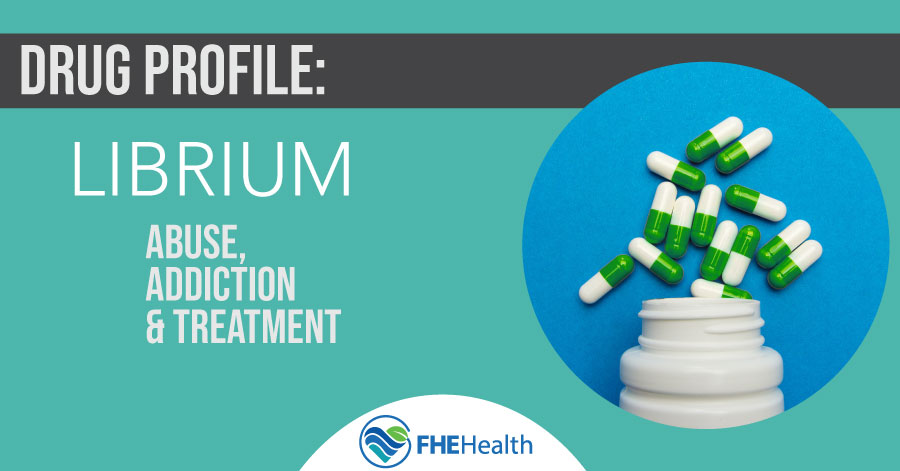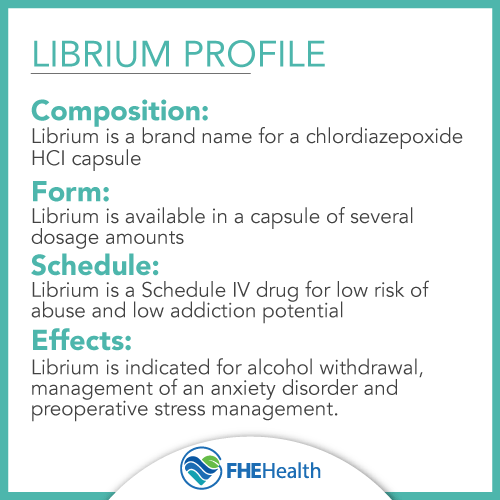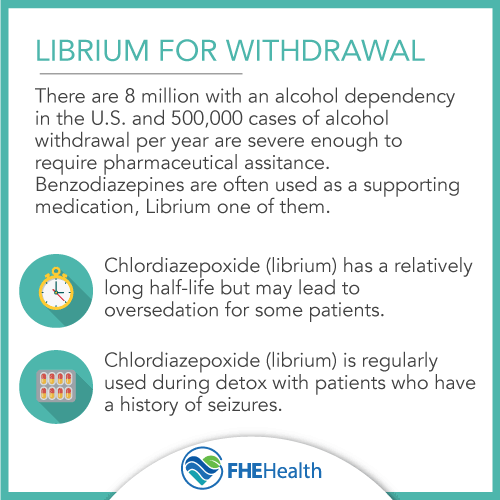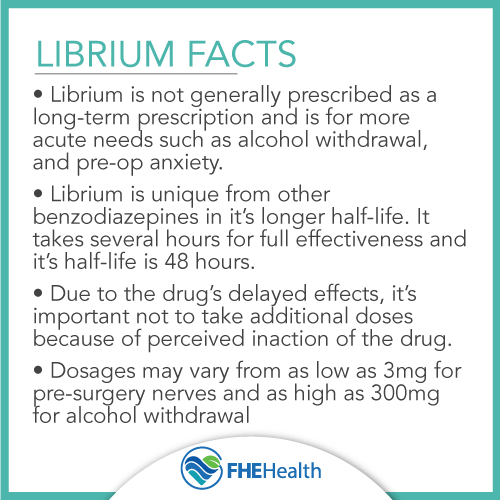
Librium, also known as “chlordiazepoxide,” is a hypnotic benzodiazepine medication used for treating issues like insomnia, anxiety, and withdrawal symptoms from drug and alcohol abuse. The drug has anxiolytic, anticonvulsant, amnesic and sedative properties. Patented in 1958 and approved for use in the medical industry in 1960, chlordiazepoxide requires a prescription for any treatment. The drug’s popularity has also waned in recent years because of the higher risk of addiction and drug dependence associated with Librium.
Benzodiazepine overdose deaths have increased significantly, with the Centers for Disease Control (CDC) reporting a rise from 1,135 fatalities in 1999 to 11,537 in 2017. Addiction and overdoses from benzo drugs like Librium can occur in any age group. Data from SAMHSA (the Substance Abuse and Mental Health Services Administration) estimated 425,000 emergency hospital visits from benzodiazepine abuse in 2011.
What is Librium?

Librium constrains the brain’s GABA receptors and reduces neural activity that causes anxiety and other similar conditions. However, someone who uses it over a long-term period may develop a physical dependence. (In reality, sometimes only short-term use can cause someone to acquire an addiction to this psychoactive drug.)
How is Librium Administered?

Dosages for Different Conditions
Severe cases of anxiety or insomnia may require higher dosages of Librium initially, which gradually taper down over time. When patients take Librium for acute alcohol withdrawal, doses are high at the start, especially on the first day, when the dose is highest before gradually tapering down. For anxiety treatment, dosage depends on the severity of the issue.
For older adults, professionals try to limit doses to prevent issues like coordination trouble and over-sedation. Experts carefully consider factors like age and other medical conditions before determining Librium doses for patients.
Avoiding Misuse and Dangerous Combinations
People who need Librium for anxiety, insomnia and/or a medically supervised detox from drugs or alcohol should avoid taking doses beyond the recommendation because of the high potential for addiction in the long run and overdoses in the short run. People taking Librium should also avoid mixing this drug with alcohol and other substances like pain medication, sleeping pills and muscle relaxants to avoid dangerous complications.
Once a patient is on Librium, experts advise a taper schedule to wean off the medication without withdrawal symptoms. (These could occur if a Librium user stops taking the medication cold turkey.)
How Long Does Librium Stay in the System?
As with any other benzodiazepine like Xanax, Librium has a long half-life. The time taken to eliminate the drug from the body can vary between people. Librium has a half-life of five to 30 hours. This means that 50 percent of the drug gets eliminated within this timeframe. Users may take Librium for a short or extended timeframe, depending on the treatment they seek. When stopping Librium use, the time taken to eliminate the drug entirely from the body depends on a range of factors.
- Age
- Bodyweight and mass
- Period of usage and dosage
- Liver function
- Genetics
- Other drugs in the system
The body primarily clears Librium through the liver, but some of the drugs may even get excreted through urine. Liver health will impact how quickly the drug clears from the body’s system. Since liver function reduces with age, older people eliminate Librium much slower than younger people.
Similarly, obese people with a higher BMI will take longer to eliminate Librium than regular-weight people. Factors like dosage and period of use also play a role in how long it takes for Librium to clear from the body.
Addiction to Librium

The drug is psychologically and physically addictive if misused. Once addicted users may experience withdrawal symptoms once they stop. Some of the symptoms include nausea, anxiety, irritability, seizures, and drug cravings. Those suffering from addiction to Librium may display some of the following behaviors:
- Increased tolerance – requiring large amounts to achieve similar effects
- Inability to stop using – failing to cut down or quit
- Intense cravings – increased desire to consume the drug
- Failures – inability to meet professional and personal obligations because of drug use
- Withdrawal symptoms – feelings of withdrawal after cutting down or quitting
- Forfeiting activities – stopping hobbies and activities for Librium use
The risk occurs more in people with a history of other drug addiction and alcohol problems or those currently abusing drugs and alcohol. But addiction can happen to anyone who takes Librium without proper professional supervision.
Side Effects of Excess Librium Use
Librium is safe and beneficial under strict guidance from a medical professional. But when abused, it can cause addiction, overdoses and a range of side effects, including –
- Extreme confusion and concentration difficulties
- Constipation
- Fainting
- Drowsiness
- Liver problems
- Altered sex drive
- Menstrual irregularities
- Skin rash
- Swelling
- Yellow skin and eyes
- Slurred speech and dry mouth
- Weakness and dizziness
- Coordination problems
- Uncontrolled gait and eye movements
- Low blood pressure
- Coma
- Upset stomach
- Appetite changes
- Poor judgment
- Depression and suicidal tendencies
- Hyperventilation
- Impaired motor functions and reflexes
- Impaired balance and muscle weakness
Overdosing on Librium is a medical emergency and requires immediate intervention to avoid extreme cases like death. The antidote for chlordiazepoxide (or any other benzodiazepine) overdose is flumazenil. It’s essential to exercise caution when administering flumazenil as it may result in severe withdrawal symptoms in addicted people.
Treatment for Librium Addiction
Stopping Librium for a person who has developed a dependence on the drug requires professional intervention because some serious withdrawal symptoms could persist, including:
- Insomnia
- Agitation
- Sweating
- Tremors
- Abdominal cramps
- Muscle aches
- Nausea
- Mood swings and depression
Some symptoms, like insomnia and depression, can persist for an extended period. To reduce any risks, professionals tend to follow a tapering process that gradually cuts down on a dose over an extended period of time.
Even people only on Librium for a few weeks should follow a tapering process to eliminate the risk of serious withdrawal symptoms that may lead to more complications. People actively trying to remove the drug from their system should drink lots of water for easier clearance through the kidneys.
Overcoming Librium Addiction with Professional Support
Librium addiction is challenging to recover from, but it is not impossible with the right intervention. If you or anyone you love is going through any drug addiction issue, ask for help to get your life back on track. FHE Health offers comprehensive support with a full continuum of care for Librium addiction, including highly customized and individualized treatment plans and caring and experienced therapists available to help you kick your Librium habit for good. Feel free to call us at (833) 596-3502 to learn more about how we can help.






